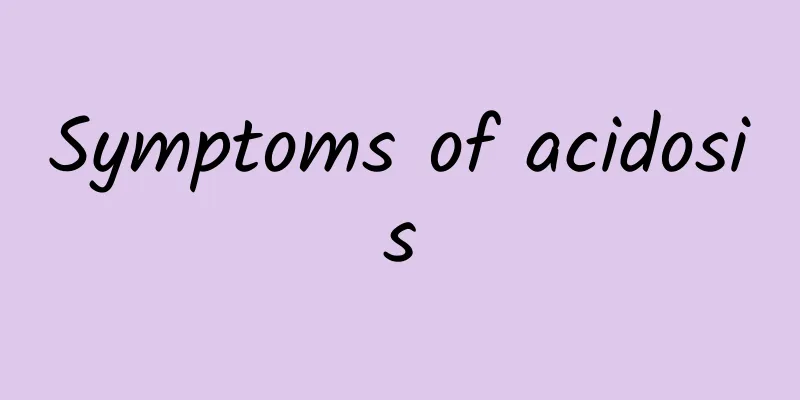Symptoms of acidosis

|
When the human body is abnormal, there will be obvious manifestations. At this time, you need to pay attention to the body, otherwise it is easy to cause some problems. When there is a disease in the body, you must also choose appropriate methods for treatment, so that it will be of great help in controlling the disease. What are the symptoms of acidosis? Many people are not very clear about this type of problem. When acidosis occurs, there are many physical symptoms. According to the physical condition, it can be well treated so that the disease can be well improved. So what are the symptoms of acidosis? Symptoms of acidosis: 1. Clinical manifestations of metabolic acidosis 1. Cardiovascular system (1) Effect on heart rate and rhythm: When blood pH drops from 7.40 to 7.10, the heart rate increases. As the pH continues to drop, the heart rate slows. It may be due to the inhibition of acetylcholine esterase, resulting in excessive accumulation of acetylcholine. Patients may develop ventricular arrhythmias, which are closely related to electrolyte disorders (especially hyperkalemia) associated with acidosis. (2) Effect on myocardial contractility: Acidosis can cause the adrenal medulla to release adrenaline, which has a positive inotropic effect. However, severe acidosis can block the effect of adrenaline on the heart, thereby weakening myocardial contractility, slowing contraction, and reducing cardiac output. Generally speaking, when pH>7.2, the two opposite effects mentioned above are basically equal, and the myocardial contractility does not change much, but when pH<7.2, the effect of adrenaline is blocked, causing the myocardial contractility to weaken. (3) Changes in the vascular system: The vascular system's responsiveness to catecholamines decreases, and H+ itself dilates blood vessels, causing the patient to experience facial flushing and a drop in blood pressure. 2. Respiratory system Breathing becomes faster and deeper, typically called Kussmaul breathing. The patient's respiratory muscles contract forcefully and the chest cavity expands as much as possible. In severe cases, respiratory rhythm changes or even respiratory arrest may occur. 3. Central nervous system Symptoms include fatigue, dizziness, drowsiness, irritability, and in severe cases, coma, and ultimately death due to paralysis of the respiratory and vasomotor centers. Patients may experience symmetrical hypotonia and decreased or absent tendon reflexes. 4. Digestive system Symptoms such as nausea, vomiting, abdominal pain, diarrhea, and poor appetite may occur. 2. Clinical manifestations of respiratory acidosis 1. Manifestations of the primary disease. 2. Respiratory system manifestations: shortness of breath, difficulty breathing, cyanosis, etc. In severe cases, breathing is irregular or tidal respiration or even respiratory arrest. 3. Neurological manifestations: CO2 retention can cause cerebral vasodilation and persistent headaches, especially at night and in the morning. Because papilledema may occur, people may have blurred vision. If the disease progresses further, "CO2 anesthesia" may occur, resulting in flapping tremors, confusion, delirium, and finally coma, which is called "pulmonary encephalopathy." CO2 is fat-soluble and can quickly pass through the blood-brain barrier, while HCO3- is water-soluble and can pass through the blood-brain barrier slowly. Therefore, the decrease in pH in cerebrospinal fluid is more obvious than that in blood. Therefore, the functional disorder of the central nervous system in respiratory acidosis is more obvious than that in metabolic acidosis. The above is a detailed introduction to the symptoms of acidosis. When the above situations occur, you must pay attention to the treatment. The treatment methods are different. Moreover, when treating acidosis, the patient’s diet must also be arranged reasonably. This will be very helpful in controlling the disease and help improve the patient’s disease.
|
Recommend
Why do hemorrhoids itch? Small hemorrhoids hide big dangers
Hemorrhoids are the most common anorectal disease...
Taking a bath like this will slowly destroy your health
Bathing can be said to be a daily cleaning task t...
What to do if there is a big gap between teeth
In our daily lives, we often struggle with oral an...
Side effects of whitening injections
Every woman hopes to have skin as white as snow, ...
What to do if vulva itching during pregnancy?
When a woman is pregnant, her body will undergo m...
Can the Bartholin's gland be punctured?
There are many organs in the human body, and diff...
Can I use air conditioning if I have cervical spondylosis?
Everyone uses air conditioning for a long time in...
What is the best way to wash your face when it itches?
Itchy face is most likely caused by skin allergie...
What is the effect of moxibustion on Shenque?
Moxibustion on the Shenque point has a good effec...
Three Yin-nourishing and lung-moistening soups to help you get rid of autumn dryness
As soon as autumn comes, everyone can clearly fee...
Difference between urticaria and hives
Rubella and urticaria are actually two different ...
What is anal fistula? Know the symptoms of anal fistula early
Anal impotence is relatively common in clinical p...
Will kidney stones cause back pain?
Kidney stones are a relatively serious disease. P...
Can I drink chrysanthemum tea when I have a cold?
When you have a cold, I believe there are many th...
Which is better, oyster or maca?
Nowadays, people pay great attention to health ca...









